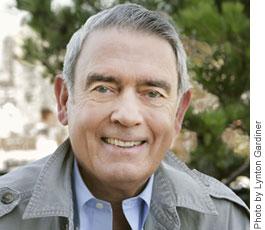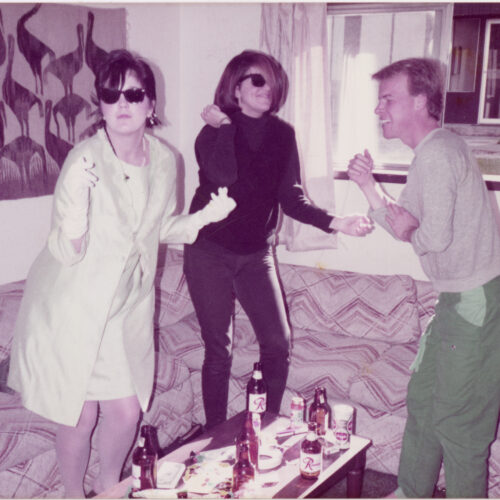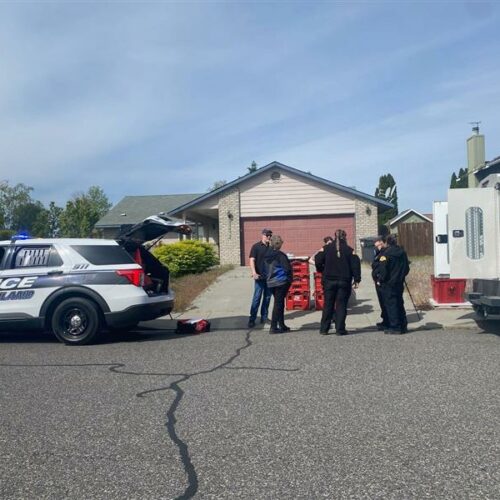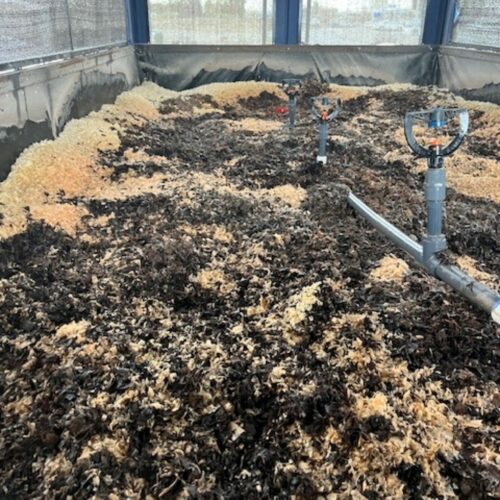
Guts, Backbone, And Competition Needed To Save American Journalism, An Interview With Dan Rather
CBS correspondent Dan Rather was awarded the Edward R. Murrow Award Thursday. Morning Edition Sueann Ramella had the chance to sit with him.
Ramella: One of the most respected and recognized names in television journalism is Dan Rather. He’s covered the biggest events of our time. From the assassination of John F. Kennedy, to the Watergate scandal, to the wars of Iraq and he’s here this morning. Good to have you with us.
Rather: It’s a great pleasure to be here.
Ramella: Now in your book Rather Outspoken, you mention Edward R. Murrow and how important he has been to you. Can you explain why?
Rather: Well he has always been my north star, and the reason is, when I was a child I was chained to the radio being bed ridden, and I followed Murrow and his now rightfully written-tarry Murrow boys all the way through. He has been…idol might be too strong, have to think about it now. He certainly has been my, as I said true north touchstone. When I wanted to say to myself, “listen I don’t think I did this as well as I could have, should have done it,” or made some journalistic compromise that I wish I hadn’t made. I always go back and read Murrow. Sometimes I read his scripts. So that’s the way he’s been through my whole life.
Ramella: What are some things Murrow has taught you?
Rather: One, that there is no substitute for high standards. The other is, he was a very much walk the ground journalist. That is, he wanted to be where the story was. So another thing I’ve taken from him is that desire to make myself a walk the ground, go there, be there, get to the heart of the story kind of reporter.
Ramella: What has happened to the evolution or state of journalism today since Edward R. Murrow?
Rather: I would say extreme, others might argue with that. But no one would argue, there’s been a demission of standards. We have a lot of excuses. None of them valid. News has to a very large extend been dumb downed. There has been what I call corporateization , politicalization, and tributeization of the news to the point that I do think Edward R. Murrow would be ashamed of a lot of what he sees. The other course, is that journalism has gone through particularly in the last eight to 10 years another transformation if you will. One, the delivery system. The internet, the change in advertising revenue and the third of course social media.
Ramella: Well with that said, you mentioned in your book how easily the internet can destroy news and create a lot of falsehoods. How does one not fall into that?
Rather: Well I wish I knew. But it’s worth thinking about. Make no mistake, I’m an optimist by experience and by nature. But there are these problems. Now with just a click. Literality with a snap of the fingers that you can spread misinformation; outright lies and it’s hard to come back and say, “wait a minute this is absolutely untrue, it’s a lie.” But by that same click or snap of the fingers you can get truth out.
Ramella: How do you personally decipher a news story online, if it sounds false or is true?
Rather: Experience comes into play here. If you paid the price and have experience over the years, you have a kid of Geiger counter within yourself and say, “this smells to me, this is suspicious.” But I think the more important thing to almost everybody now is given that we are in this digital age is that old journalism canard which says, “you trust your mother but you cut the cards.” Which is to say, “okay this is what they say, now let me go to other sources and check it out and see whether is checks out or not.”
Ramella: What are some sources that you go to that you trust?
Rather: It’s always difficult for me to make a list because I’m fearful I’ll leave someone out, but the Associated Press, and Reuters to name two. I think consistently produced journalism of integrity. National Public Radio, not because we’re speaking in public radio. I’m in an age in stage where I don’t have to kiss up to anyone anymore and god isn’t it wonderful. So I’m not doing it because I’m on your air. But I think National Public Radio does the best job of covering both national and international views, as well as cultural and other news. On television, the three major network newscasts is ABC, NBC, and CBS. Those evening newscast are led by people that I know and all three of them are trying to do a good job. Diane Sawyer, Brian Williams, and Scott Pelley, I know them. However, their networks are owned by huge international corporations. This isn’t healthy for the country. Competition is gone. At least 80 percent of the true national distribution of news is now controlled by no more than six and I think four very large corporations. My point is, that while these are three good people, I trust all three of them, that I am aware they are operating in the environment I just described which created tremendous pressure on them.
Ramella: What are your suggestions to get out of that?
Rather: We need guts. We’ve lost our courage. There’s such a price to pay if you don’t play along to get along. If you don’t do that, if you ask the tough questions, ask the tough follow up question, you could expect to be called a communist, a socialist, or a long list of bad names. To answer your question, what do journalist need to do. The first thing is to get back to fundamentals, and the fundamentals are we are supposed to be a check and balance on power. We’re supposed to be watch dogs, not attack dogs but certainly not lap dogs, and to mix my metaphors we need a spine transplant. It’s easy to say and tough to carry out I know as a working journalist in today’s environment but that’s where we start. I think the second thing, which is a broader view of societal issue is how to get back to more competition in journalism, less consolidation if you will of media power and profit making enterprises. A true freely independent, fiercely independent press is the red beating heart of freedom and democracy. We know that. We tend to forget it as time goes along. So when we talk about these things of what journalist should do, suck it up, return to our guts, strong spine, and don’t be afraid to ask tough questions. We talk about how to increase not decrease competition. It’s not just for journalist. This deals with the vitals of the country.
Copyright 2012 Northwest Public Radio
Related Stories:

‘Higher Ground’ exhibit explores queer life on the Palouse
A new exhibit of queer art and ephemera at Washington State University is showcasing LGBTQ+ lives and experiences in the rural Palouse region.
Continue Reading ‘Higher Ground’ exhibit explores queer life on the Palouse

ACLU to challenge Sunnyside School District Board elections
The Sunnyside School District Board could be the next jurisdiction to face a lawsuit for violating the Washington State Voting Rights Act. A group has notified the District that the election system dilutes the Latino vote, and if it’s not fixed, the District could end up in court. Continue Reading ACLU to challenge Sunnyside School District Board elections

West Richland double-murder, kidnapping suspect shot at police, officials say
FBI, county and police officials wait for the all-clear to collect evidence at the home of Elias Huizar, 39, where his 17-year-old girlfriend, Angelica Santos, was found dead. (Credit: Anna… Continue Reading West Richland double-murder, kidnapping suspect shot at police, officials say












